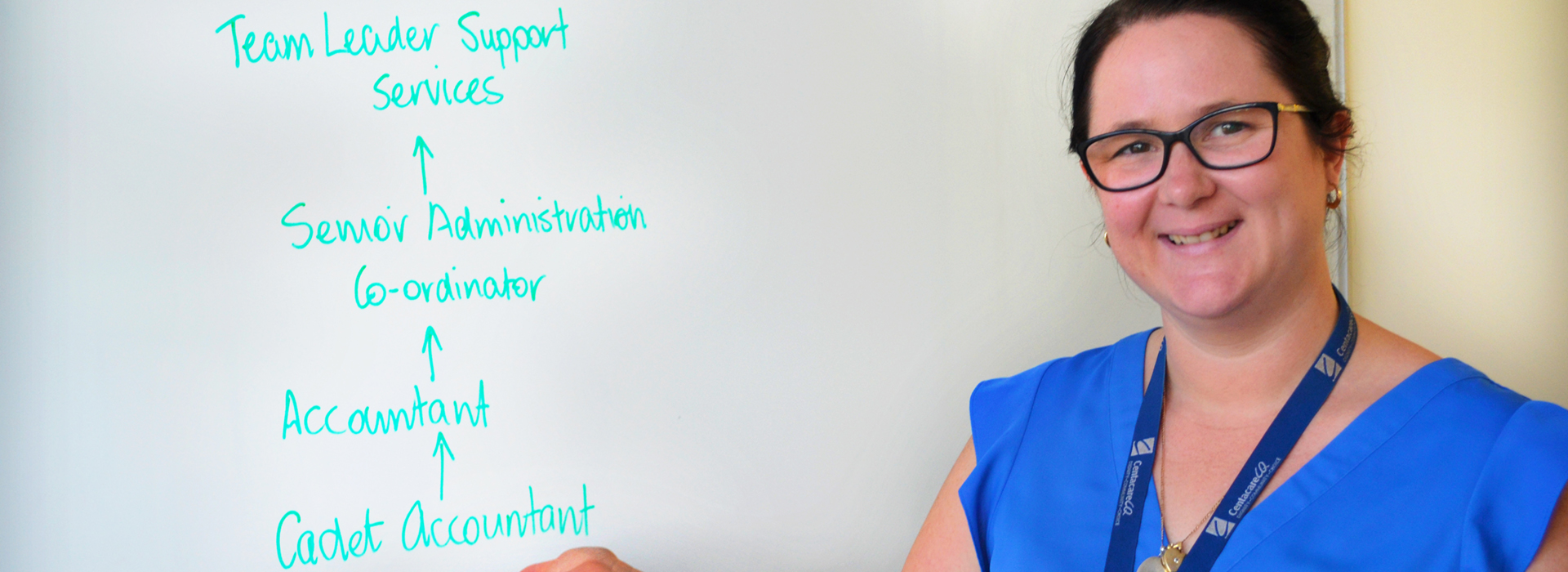CentacareCQ cadet accountants
- Inside-up
- Community Services Sector
- Rockhampton, Central Queensland

The Challenge
CentacareCQ, a social services agency with a considerable geographical coverage area, including areas of socioeconomic disadvantage, experienced difficulty recruiting to their finance team during a regional skills shortage.
The Solution
- To attract, recruit and develop an undergraduate accountant into their finance team who could develop the specific skills required for not-for-profit accounting
- To support the undergraduate during their degree through a development plan
- To increase the diversity of the finance team, and bring in new perspectives and up-to-date practice methods
Implementation
CentacareCQ has introduced an accountant cadet program, whereby cadet accountants are employed in their first year of university and supported throughout their degree. The cadets develop their skills in entry-level finance functions by shadowing other team members. The organisation ensures that the tasks provided are appropriate for their level of education and experience, and their work structure is flexible enough to accommodate university commitments. Upon graduating, cadets are assessed by the organisation prior to being offered a permanent role as a graduate accountant. As a cadet progresses into another role, recruitment starts for a new cadet accountant.
Organisational strategies
- CentacareCQ meets all costs of recruitment and salary costs for the students, and some basic study support costs.
- Access to flexible working arrangements has been increased, particularly among staff who do not have face-to-face client responsibilities. The recruitment of a cadet started this process, as part-time working options are essential for students
- In the most recent round of cadet recruitment, CentacareCQ’s Human Resources Officer held an assessment day process for candidate selection.
Partnership strategies
Though not a formal partnership, CentacareCQ has a good relationship with the local university that simplifies publicising recruitment opportunities to existing students.
Program design strategies
- Cadet employment exposes students to different aspects of finance and accounting by having them shadow an existing finance officer. Once the cadets are competent in a job function they take on some responsibilities as part of their own role, and move on to a new competency.
- The development program focuses on fundamentals first, increasing in complexity as the cadet’s employment and study progresses.
- Cadets are hired in their first year of study, and usually complete their degrees over 3-4 years. Six months after graduation they are assessed by the organisation and promoted to graduate accountant.
- As each cadet is promoted to graduate accountant, recruitment starts for a new cadet accountant.
- With the sector becoming a more attractive place to work, and awareness of CentacareCQ’s successful cadet program growing, applicant numbers are increasing. CentacareCQ has moved to an assessment day process for recruitment, as this is more efficient for higher applicant numbers.
Results
- Of the three cadets employed since 2008, all are still with the organisation.
- The first two recruits have moved on to more senior roles, including one on the senior management team.
- Recruiting ‘clean slate’ employees is an effective and efficient way to develop not-for-profit accounting skills.
- The age diversity of the accounting team has improved.
- The model is now used elsewhere in the organisation.
Lessons Learned
- Be mindful of cadets’ age, life experience and readiness for work levels. It is important to manage both their own expectations, and those of other staff members who may not be aware of the scope of their role.
- Pitch the job at the correct level for an undergraduate student.
- The organisation and relevant team members must be able and willing to support a younger person new to the workforce.
- CentacareCQ acknowledges that had the first cadet not worked out as well as she did, the program may not have continued. So, if implementing a new workforce approach, it is wise to pay close attention to the recruitment and selection process.
- Recruiting and training someone to the organisation’s exact accounting methods has been very efficient and time saving.
- As this is a long-term process, the dividends of an inside-up Grow Your Own (GYO) approach may only become evident over time.
- Document the development process that the cadet will undertake, and what the program approach is.
- Build in flexibility to the role with the understanding that university commitments come first.
REQUIREMENTS FOR
REPLICATION
Do you…
- have a team able and willing to coach and develop a young cadet?
- have a plan for progression and development?
Can you…
- link with local students training in the required discipline(s)?
- accommodate study time requirements?
- identify opportunities for progression through the organisation?
- wait until graduation to fill the role?
- manage the expectations of team mates and the wider organisation of the appropriate level and function of the cadet?
CONSIDERATIONS FOR PROGRAM SCALING
Do you…
- have realistic job opportunities at a graduate level?
- have the financial and personnel resources needed to support the program size?
- have management support and commitment to allocate the required resources?
- have staff with capability and capacity to provide mentoring and development support?
POTENTIAL RISKS
What if…
- staff are not willing or able to support the cadet to eventually take on aspects of their work?
- the organisation or team culture is not supportive of younger employees starting their career?
- you have no plan in place to develop or progress the cadet?
- there is a lack of genuine opportunities in the organisation?
- work tasks are not appropriate for training and experience level?
- you use this long-term method to fill a short-term recruitment need?
